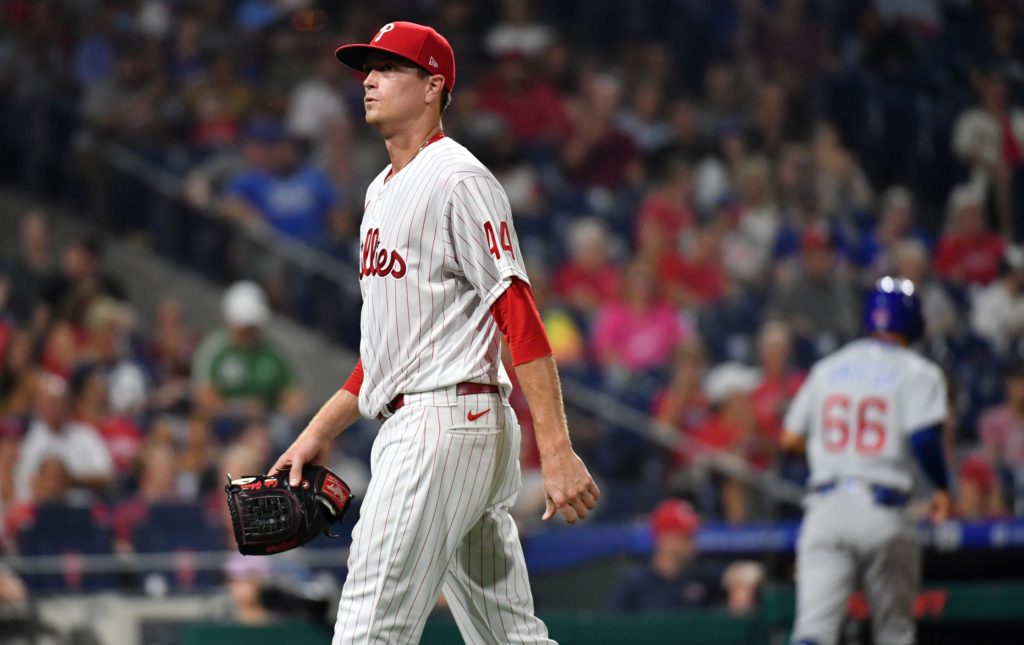Ad Disclosure
And That Should Do It — Thanks For Coming Out, Phils
By Bob Wankel
Published:

Really, the story here is no longer about the game.
The Phillies wasted a few scoring opportunities. After a sharp start, Kyle Gibson ran into some issues in a long fifth inning. His teammates were then unable to recover in losing to a team that began the night 14 games under .500.
Worse yet, the Phillies are now 1-4 on a disaster of a home stand against two opponents with a combined 49-94 road record this season.
But the particulars no longer matter, much the way the 2021 Phillies no longer matter.
Truthfully, whatever remaining relevance this team held among an understandably and increasingly exasperated fan base expired late Sunday afternoon. A third loss in four games to the Rockies paired with a promising Week 1 start for the Eagles did the trick.
But just in case anyone out there took the Phillies’ off-day Monday to talk themselves into the team drumming up one last run against yet another favorable opponent, they now have to know it’s over.
.@PatrickWisdom5 ties a #Cubs rookie record with home run No. 26!#DailyWisdom pic.twitter.com/6EI5hb2EqN
— Chicago Cubs (@Cubs) September 15, 2021
At this point, not even the incompetence of the participants vying for the National League’s second wild card spot could fool the biggest optimist into thinking otherwise.
So please, let’s stop with the out-of-town scoreboard updates. No more check-ins on the Reds, Cardinals, and Mets. And for the love of God, blast all strength of schedule reminders — or mentions of the three remaining games with the Braves in Atlanta later this month — into the sun.
The Phillies had plenty of chances this season. In fact, they had far more chances than they could have reasonably expected.
And yet, the reality is that the Phillies will almost certainly miss the playoffs for a tenth straight season. The organization’s key decision-makers will do what the organization’s key decision-makers have done every October since 2012. They will fill an October void by engaging in some familiar finger-pointing before getting around to the framework of devising a plan about how to fix things.
Atop the list this fall will be a dreadful bullpen, woeful defense, and a core that just doesn’t seem to know how to win.
The talent deficiencies are both obvious and real, but that last harder-to-define variable cannot be sidestepped.
When president of baseball operations Dave Dombrowski finally huddles with members of his front office to assess the team’s current state of affairs, the group would be wise to discuss intangibles and ask questions with less obvious answers.
For instance, why did this particular group of players consistently fail to pounce on advantageous situations and so often struggle to handle supposedly inferior opponents? Why couldn’t it sustain success for stretches that lasted beyond a week? Why did it so routinely scoff at good fortune and instead cling to the .500 mark with a seemingly magnetic force?
Surely, Phillies fans could use some reason to believe things will finally change next season. Perhaps that hope will be found in Dombrowski.
Although he wasn’t perfect in an abbreviated first offseason with the team, Dombrowski spent much of this season evaluating the organization at all levels, noting what worked, what didn’t work, and why. Known to be aggressive, he undoubtedly understands the urgency to end this embarrassing drought and has certainly already considered paths forward — perhaps even uncomfortable paths — to accomplish it.
This hypothesis requires some benefit of the doubt, for sure. But when hope can’t be found on the field, the search for it requires some creativity.
Bob Wankel covers the Phillies for Crossing Broad. He is also the Vice President of Sports Betting Content at SportRadar. On Twitter: @Bob_Wankel E-mail: b.wankel@sportradar.com